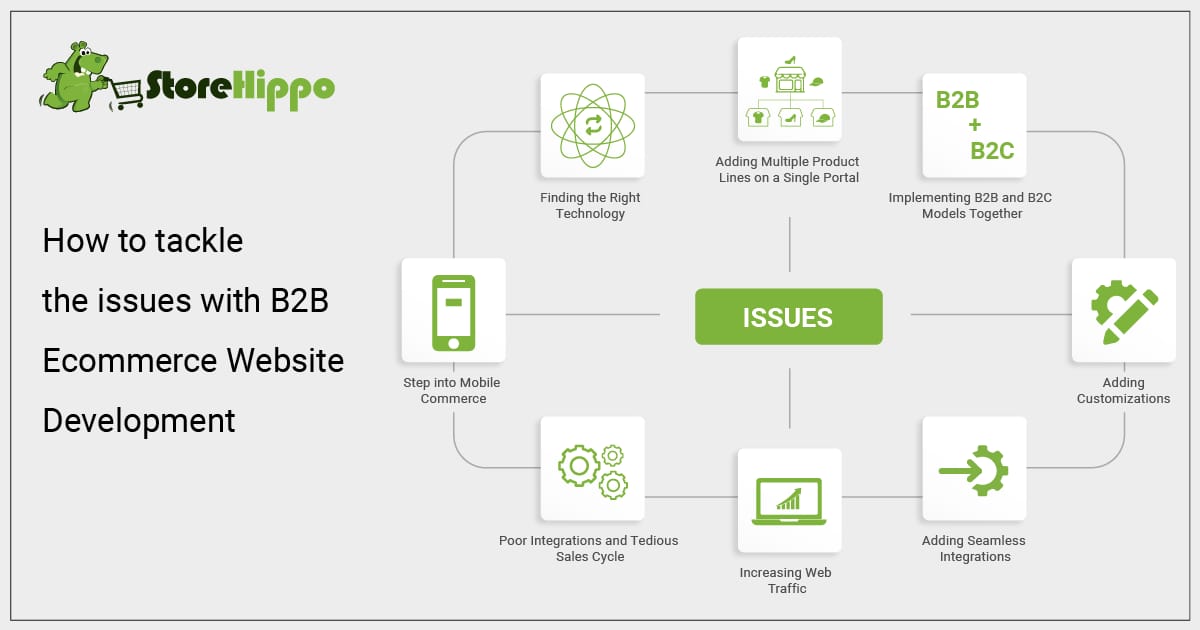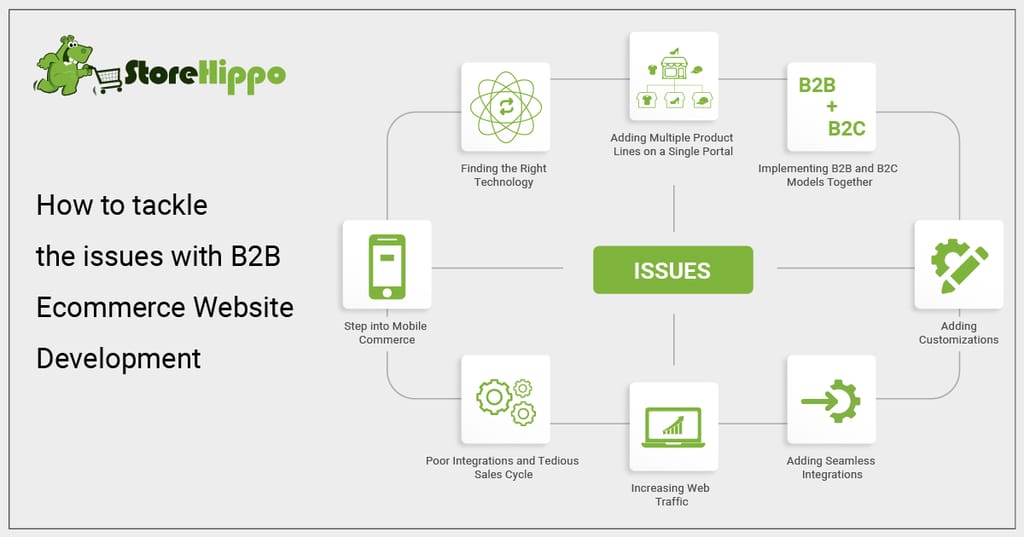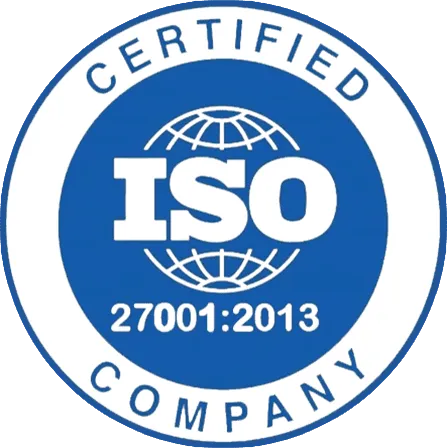How often do you shop online? If you’re an average person, you must have placed several orders online over the last few years or months. Whether it is for personal use or business purposes, more and more customers in India are turning to the internet for their shopping needs every day. Ecommerce is enjoying a fast-growing popularity in India and the ecommerce market is constantly expanding. In fact, the Indian ecommerce market is expected to grow in revenue to US$ 200 billion by 2026.
In the current times, a lot of opportunities have opened up for B2B and B2C business owners to venture into ecommerce and enjoy benefits such as increased reach, easier marketing and many more. However, while starting an ecommerce business might be a lucrative idea, B2B ecommerce website development comes with its own set of challenges. Businesspersons sometimes overlook certain aspects while developing the website, which later cause hindrance in proper functioning of their marketplace website.
Table of Contents
Here, we have mentioned 8 such nagging issues faced while building a B2B ecommerce website:
1. Finding the Right Technology
Developing an ecommerce marketplace is about more than just creating a website and uploading products on it. It is also important to ensure that your website is technologically advanced and offers an enhanced user experience. Using outdated technology can create an unpleasant customer experience and stall the growth of your business.
To avoid such a situation, you should seek the right B2B ecommerce solutions that uses the latest technologies to help you stay ahead of your competitors.
Three major ways technology impacts your platform are:
- Performance and Scalability
No one loves slow-loading sites. It is, therefore, necessary to make sure your ecommerce website is high performance to facilitate a satisfying customer experience. It is advisable to use a scalable ecommerce platform that accommodates the increasing traffic on your site without compromising on the site loading time or features.
- Mobile Apps
If you’re not available on mobile, you’re doing it wrong. Most B2B ecommerce solutions include the option of developing mobile apps by default. This is because mobile apps contribute to more than half of the ecommerce sales on an average.
- PWA
Apart from that, it is important that your ecommerce site looks, feels, and functions like a mobile app even when it is opened in a browser. Such sites are known as PWA sites. StoreHippo specializes in developing PWA sites that are fast, portable, and even work in case of no or poor connectivity.
2. Adding Multiple Product Lines on a Single Portal
A major issue to be taken care of during the development of your B2B ecommerce website is that it allows you to add multiple product lines on the same portal.
B2B enterprises generally offer multiple product lines and brands. They deal with different distributors, manufacturers, and vendors. Therefore, it is important that their B2B ecommerce platform does not limit the scope of their business. Rather, the platform should be able to make management of each stakeholder easier. A marketplace website without this feature would not be a preferred shopping destination for customers as they might not be able to find all the needed products there. As a result, they might move to another online marketplace offering multiple categories of products at the same place
3. Implementing B2B and B2C Models Together
If we consider B2C ecommerce sites, they are attractive and well-designed and come with loads of features. These days, B2B ecommerce platforms are also expected to have the features of B2C websites like personalization, easy search, multiple payment options, etc.
Moreover, who knows if an enterprise that is currently into B2B business wants to switch to B2C in the future? It should not have to re-build the website from scratch if they shift their business focus later, don’t you agree?
Implementing B2B and B2C models into one platform is the third issue of B2B ecommerce website development. However, with StoreHippo, this is not a concern as it offers a flexible ecommerce platform for business.
4. Adding Customizations
Each B2B business has unique offerings and requirements and an ecommerce model that suits one business might not suit the other. This is where the feature of customization comes in handy. By using this feature, you can add features to your website that are specific to your business. For example, if you have a market in Norway, then your platform should allow you to set Norwegian as a language on your website
A rigid platform that does not allow you to add customizations would be of little help to you, as you would not be able to make offerings that are unique to your business. Also, if the website features do not reflect your brand, then it will fail to create a distinct brand identity in the minds of the users.
An ideal B2B ecommerce platform would allow you to implement customizations easily and quickly, so that you can create a website as per your business preferences.
5. Adding Seamless Integrations
Every ecommerce business requires certain integrations such as ERP, CRM, logistics, payment gateways, etc. to complete the sales process. Moreover, many businesses use additional software for calculations, e-mail management, etc. to make their work quicker and easier.
However, not all ecommerce platforms offer this feature, which makes it challenging for enterprises to manage their business operations. Allowing internal and external integrations in the website is therefore another issue faced during B2B ecommerce website development.
However, with StoreHippo, you would not face this issue as this platform allows you to add integrations to your ecommerce website seamlessly.
6. Increasing Web Traffic
Competition is increasing and it is not an easy job to drive traffic to your website. However, you should remember the power of content in the digital world. Certain practices such as inbound marketing can help boost your business significantly. Have you considered that a majority of your customers are available online and can be easily targeted with some marketing efforts?
An ideal B2B ecommerce platform will offer features that will support you in your marketing efforts. Three tools to increase your web traffic by inbound marketing are:
- Blog
Blogs are a helpful tool used by businesses to promote the products that they deal in. With more and more ecommerce websites using blogs for generating leads and increasing website traffic, using an ecommerce platform that does not allow you to build an engaging blog would automatically take your one step behind.
- SEO
The world of digital marketing is highly driven by SEO. SEO practices help in ranking your website among the top search results for a particular keyword. Using an ecommerce website that does not allow you to add relevant keywords is literally the one thing you shouldn’t do on the web.
- Social Media
Your B2B ecommerce platform should allow you to post directly on social media platforms for better engagement and awareness of your audience. A website that does not have a social media share button - are you even considering it?
7. Poor Integrations and Tedious Sales Cycle
In a B2B business, a long sales cycle is unavoidable. However, days when each step was carried out manually are long gone. Today, the sales cycle is made shorter by automation. And using an ecommerce platform that does not make the sales process easier is simply a waste of time.
Here are a few examples of how the right ecommerce platform can make your work automatic and faster:
CRM System
This feature will help you gather information about your customers automatically and resolve their queries. Customers would be more satisfied if instead of going to and fro for gathering quotes, they can just fill in a request/query and get answers. This feature can help build improved relationships with your customers.
Global Reach
During your B2B ecommerce website development, make sure it has the features for you to reach global markets and expand your market. Opting for an ecommerce platform without this feature thinking that you will not be expanding your business would be a major risk. It is advisable to keep your options open and go for a platform that allows you to go global if and when you decide to.
Integrations
An inept ecommerce platform will not allow you to add integrations, while a good platform will so that there are no hiccups in conducting business. An ideal platform will have pre-integrations for common features such as logistics, payments, etc. that you can easily use without any extra cost.
8. Step into Mobile Commerce
Mobile commerce is something that cannot be ignored in the current times. With a major percentage of customers preferring to shop online over offline markets, not having mobile solutions can limit your reach.
This is why StoreHippo is the right ecommerce partner for you. The marketplaces built by StoreHippo are progressive web apps (PWAs) that inherently look, feel, and function like mobile apps. This offers the customers ease of usage.
Another important aspect to consider during the development of your B2B ecommerce website is mobile marketing. Features such as push notifications, location-based offers (using GPS), mobile ads, SMS, etc. can be really helpful to increase user participation and boost sales. StoreHippo offers these features which are highly useful in grasping the attention of your customers.
These are a few issues faced while developing a B2B ecommerce website. As a business owner, it is important to make sure that your marketplace website does not face these problems. By opting for the right ecommerce platform that provides advanced and innovative features and designs, these challenges can be easily overcome.
StoreHippo is a SaaS-based ecommerce platform offering comprehensive B2B ecommerce solutions that can help you stay ahead in your ecommerce game. It offers a host of features such as multi vendor, multilingual, multi store, and multi currency marketplace, free SSL, inbuilt marketing tools, discount engine and many more. Reach out to us and get an issue-free B2B ecommerce website started in no time! Schedule a demo here.





















Leave A Comment